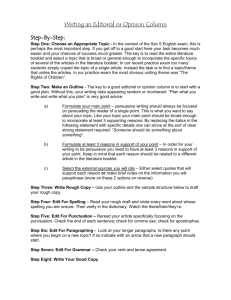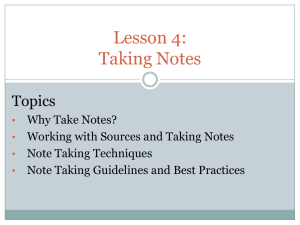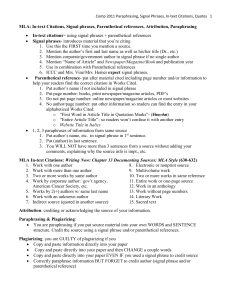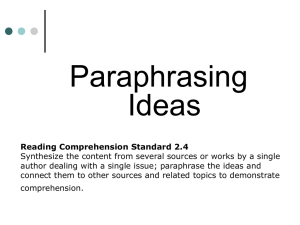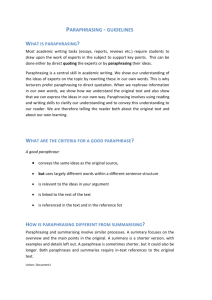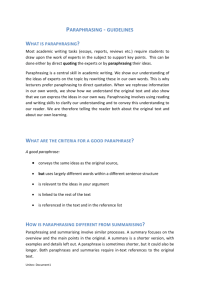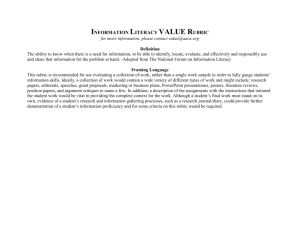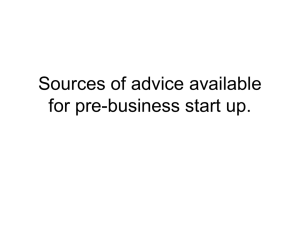Writing an OPINION COLUMN
advertisement
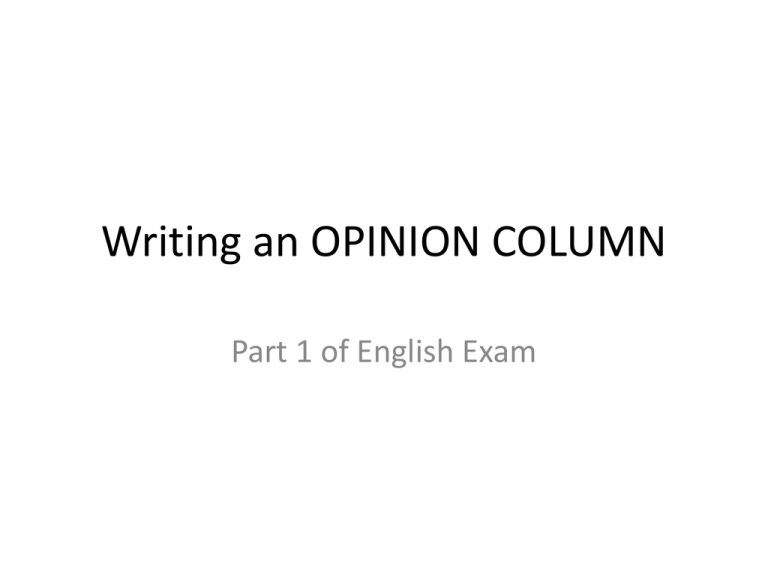
Writing an OPINION COLUMN Part 1 of English Exam Step One: Choose an Appropriate Topic • 1) In the context of the Sec 5 English exam, this is perhaps the most important step. If you get off to a good start here your task becomes much easier and your chances of success much greater. Step 1 continued… • 2) The key is to read the entire literature booklet and select a topic that is general enough to incorporate the specific topics of several of the articles in the literature booklet. (e.g. child soldiers or child labour) Step Two: Make an Outline • 1) The key to a good opinion column is to start with a good plan. Without this, your writing risks appearing random or incoherent. “Plan what you write and write what you plan” is very good advice. Step 2 continued… • Formulate your MAIN POINT – persuasive writing should always be focused on persuading the reader of a single point. This is what you want to say about your topic. (THINK THESIS = What do you want to say ABOUT child labour?) • Your main point/THESIS should be broad enough to incorporate at least SEVERAL (2-5) supporting reasons. • By replacing the italics in the following statement with specific details one can arrive at the sort of clear strong statement required: “Someone should do something about something”. Step 2 continued… • Formulate at least 2-5 REASONS/FACTS in support of your point – In order for your writing to be persuasive you need to have at least 2-5 reasons/facts in support of your main point. • We encourage you to use more than 1 article in the literature booklet. Step 2 continued… • Select the external SOURCES you will cite. Either select quotes that will support each reason or make brief notes on the information you will paraphrase. Quoting vs. Paraphrasing • In either case, because this is not an essay or a research paper, you do not include a bibliography. Instead you acknowledge the source right in the text. • For example: “According to the article Saving the Child Soldiers by Bill Smith…” Paraphrasing • Paraphrasing should be used when summarizing or describing the central aspect of a text. Paraphrasing is more common in opinion column writing. • For example: “In the play An Enemy of the People, Henrik Ibsen explores the theme of power vs. truth…” Quoting • Quotes should only be used when there is something specific about the author’s words you need to reveal to your reader. This could be a precise statistic or a very specific phrase. Step Three: Write Rough Copy • Use your outline and the sample structure below to draft your rough copy. Step Four: Self-Edit For Spelling • Read your rough draft and circle every word about whose spelling you are unsure. Then verify in the dictionary. Watch the there/their/they’re. Step Five: Self-Edit For Punctuation • Reread your article specifically focusing on the punctuation. Check the end of each sentence; check for comma use; check for apostrophes. Step Six: Self-Edit For Paragraphing • Look at your longer paragraphs. Is there any point where you begin on a new topic? If so indicate with an arrow that a new paragraph should start. Step Seven: Self-Edit For Grammar • Check your verb and tense agreement. Step Eight: Write Your Good Copy Sample Structure • Headline (Title) - Try to use some alliteration • By-line – your name • Lead (hook) – A shocking stat or a rhetorical question works well. - Creatively introduce your topic - Clearly present your main point • (50) • Present your 2-5 supporting FACTS: (each fact is its own paragraph) This involves: POINT – state the fact; PROOF – paraphrase or quote an external source; ANALYSIS – comment on the proof presented. (250) Write about YOUR OPINION on the facts you have included (start with a strong stance). Comment on each fact. Transition in to a personal experience (optional). (250) • Conclude by creatively restating your main point • Finish with a statement linking to your lead ( a CALL to ACTION works well). (50) • Headline / By-line / Lead (50 words) 2-5 FACTS (250) Opinion + Personal Experience (250) Closing + Call-to- Action (50)
